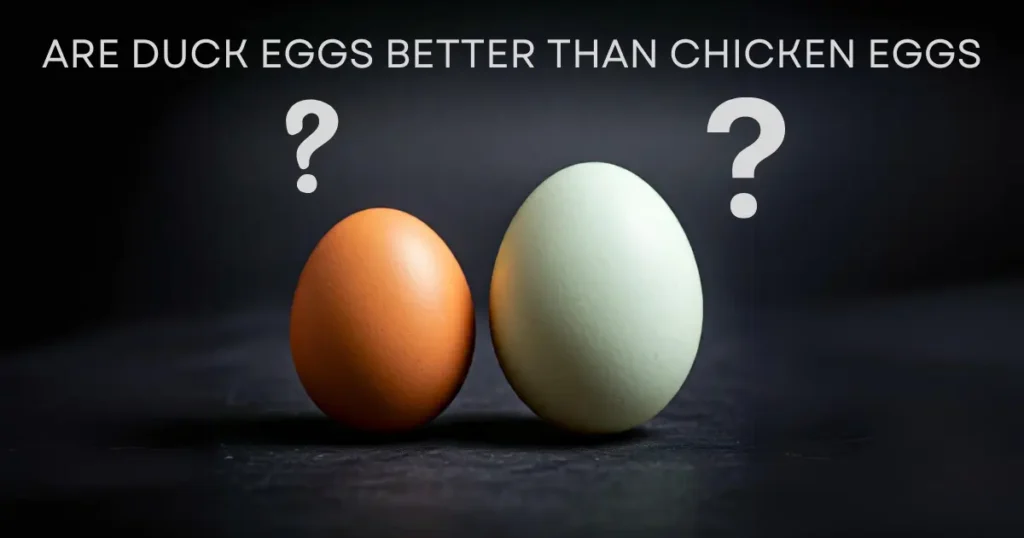Duck eggs are often considered better than chicken eggs due to their richer flavor, higher nutritional content, and baking properties. But the choice depends on personal preferences and dietary needs. These two eggs are both nutritious options. But their differences in taste, nutrition, and culinary uses often lead people to wonder which is superior. In this article, we will explore the pros and cons of both types of eggs to help you make an informed choice.
Nutritional Comparison of Duck Eggs vs Chicken Eggs
When comparing the nutrition of duck and chicken eggs, it becomes clear that duck eggs pack a bigger punch in several areas. Here’s a breakdown:
| Nutrient | Duck Eggs (per large egg) | Chicken Eggs (per large egg) |
| Calories | 130 | 70 |
| Protein | 9 grams | 6 grams |
| Fat | 10 grams | 5 grams |
| Cholesterol | 619 mg | 186 mg |
| Vitamin B12 | 3.8 mcg | 0.6 mcg |
| Omega-3 | 71 mg | 37 mg |
As the table shows, duck eggs contain more calories, protein, fat, and cholesterol than chicken eggs. They also provide significantly higher amounts of certain vitamins like B12 and omega-3 fatty acids. They are essential for brain health.
Taste and Texture
Duck eggs offer a more robust and velvety flavor than chicken eggs. This flavor difference makes them especially prized by bakers. The higher fat content in duck eggs leads to richer, fluffier cakes and pastries, making them ideal for baking.
Chicken eggs, on the other hand, have a milder flavor and a more familiar texture, which some people may prefer for everyday cooking and eating.
Allergies and Sensitivities
Some people who are allergic to chicken eggs find they can tolerate duck eggs, as the proteins that trigger allergies differ between the two. However, duck eggs have higher cholesterol and fat, which might not be ideal for those with specific dietary restrictions. Specially for those people who are watching their heart health.
Shelf Life and Durability

Duck eggs have thicker shells, which help them stay fresh for a longer period compared to chicken eggs. This makes duck eggs a more durable option for storage.
- Duck eggs: Last longer due to their thicker shells. To learn more about it , you can check the article:
Do Fresh Duck Eggs Need to Be Refrigerated?
- Chicken eggs: Have a shorter shelf life, especially once washed.
Cooking Uses
Duck eggs are known for their richness and are often used in gourmet dishes and baking. Due to their thicker whites and larger yolks, they are favored by chefs. For making custards, pastries, and other baked goods that require a richer texture, duck eggs are best. On the other hand, chicken eggs are versatile and can be used in a wide variety of everyday dishes, from scrambled eggs to omelets.
Price and Availability
In the U.S., duck eggs are often more expensive and harder to find than chicken eggs, largely because fewer farms raise ducks for egg production. Chicken eggs are more common, widely available, and generally cheaper.
| Aspect | Duck Eggs | Chicken Eggs |
| Availability | Less common | Widely available |
| Price (per dozen) | $6-$12 | $2-$4 |
Health Benefits and Drawbacks
- Duck Eggs: Rich in nutrients, especially vitamins like B12 and omega-3s, and beneficial for energy and brain function. However, their high cholesterol and fat content could be a concern for some.
- Chicken Eggs: Lower in calories, cholesterol, and fat. They are more suitable for people looking for a lighter option in their diet.
For more information about the benefits of duck eggs , you can check the article linked below:
Are Duck Eggs Better Than Chicken Eggs for Baking?
Yes, duck eggs are better for baking due to their larger yolks and higher fat content. They help create fluffier, richer cakes and breads. However, for everyday cooking, chicken eggs might be more suitable.
So, are duck eggs better than chicken eggs? It depends on your personal needs. If you prefer richer flavors, are looking for a boost in vitamins, or need an egg that works wonders in baked goods, duck eggs are a great choice. However, if you’re looking for a lighter, more affordable, and easily accessible option, chicken eggs might be the way to go.
External Resources
For more detailed nutritional guidelines and advice, visit these government and educational resources:



